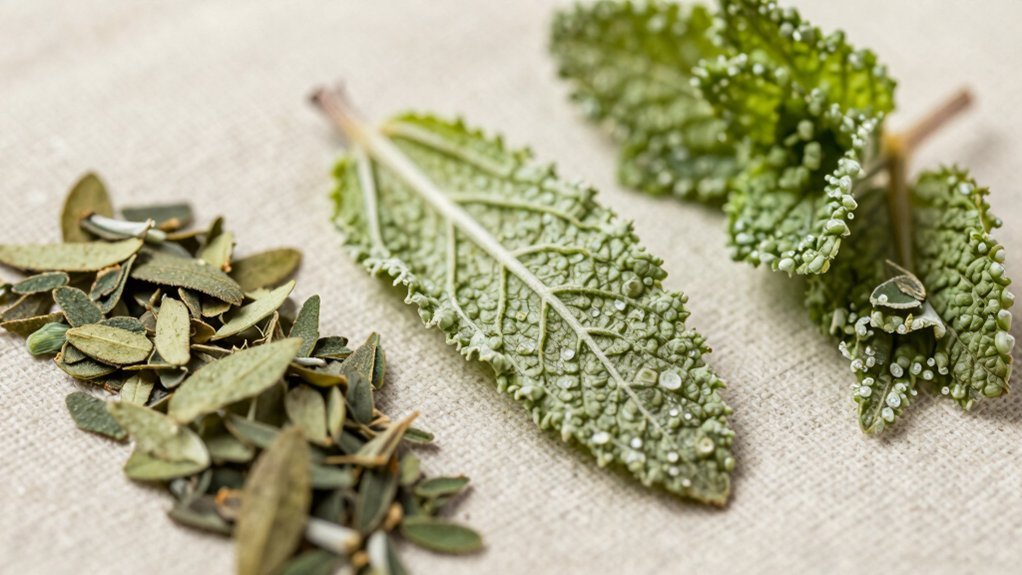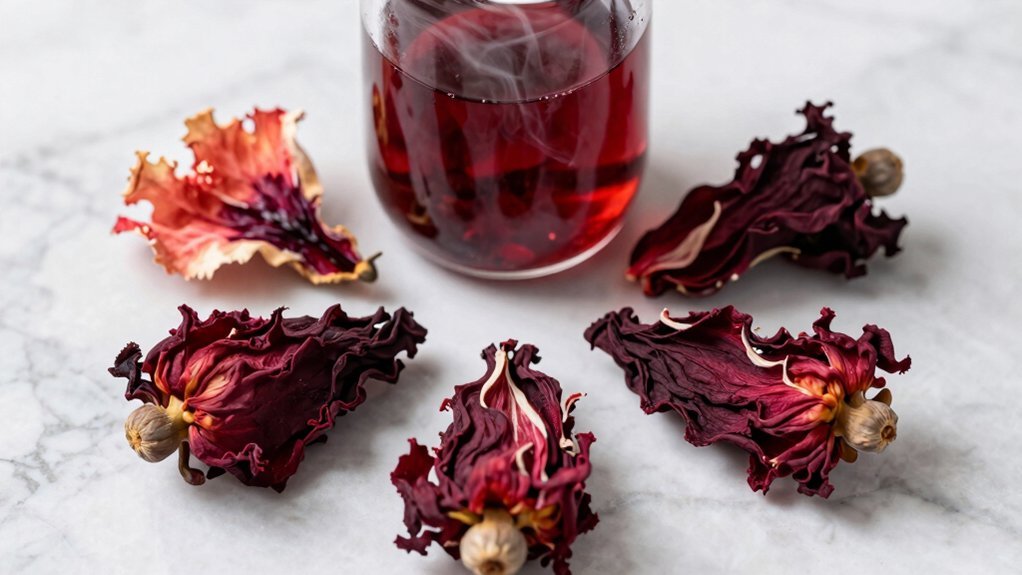You'll find a variety of eco-friendly tea bag options for your homemade blends that reduce environmental impact while enhancing your brewing experience. Unbleached cotton muslin bags offer a natural, chemical-free choice. Hemp fiber sachets provide durability with minimal ecological footprint. Compostable corn fiber pouches break down completely in commercial facilities. Reusable stainless steel infusers eliminate waste entirely. Biodegradable paper filters decompose easily in compost or landfills. Each option has unique benefits, from improved flavor extraction to zero-waste lifestyles. By choosing these alternatives, you're not only elevating your tea ritual but also contributing to a more sustainable future. Discover how these eco-friendly choices can transform your daily cup.
Unbleached Cotton Muslin Bags

Sustainability meets simplicity with unbleached cotton muslin tea bags. These reusable bags offer an eco-friendly alternative to disposable options, reducing waste and minimizing your environmental impact.
Made from natural, unbleached cotton fibers, they're free from harmful chemicals and bleaching agents, ensuring your tea remains pure and untainted.
You'll appreciate the versatility of these bags, as they're suitable for both loose leaf teas and your own custom blends. Their breathable fabric allows ideal infusion, resulting in flavorful brews every time.
The fine weave prevents tea particles from escaping, giving you a smooth, sediment-free cup.
Cleaning and maintaining these bags is a breeze. Simply rinse them after use and hang to dry. For a deeper clean, you can toss them in the washing machine.
Their durability means you'll be using them for years, making them a cost-effective choice in the long run.
When shopping for unbleached cotton muslin tea bags, look for organic options to further reduce your ecological footprint.
You'll find various sizes available, from single-cup sachets to larger bags for teapots or cold brew batches.
Hemp Fiber Tea Sachets
Moving from cotton to another plant-based option, hemp fiber tea sachets offer a robust and sustainable choice for tea enthusiasts. You'll find these sachets made from the strong fibers of the hemp plant, known for its rapid growth and minimal environmental impact. Hemp requires less water and fewer pesticides than cotton, making it an eco-friendly alternative.
When you're brewing tea with hemp sachets, you'll notice their durability. They resist tearing and hold up well to hot water, ensuring your tea leaves stay contained. The natural fibers allow for excellent water flow, resulting in a well-infused cup of tea. Hemp's porous nature also lets the tea's aroma permeate through, enhancing your sensory experience.
You can compost hemp sachets after use, as they're 100% biodegradable. This feature aligns perfectly with a zero-waste lifestyle. When shopping for hemp sachets, look for options without added chemicals or bleaching agents to maintain their eco-friendly status.
You'll find them available in various sizes to accommodate different tea blends and brewing preferences. By choosing hemp fiber tea sachets, you're supporting sustainable agriculture while enjoying a high-quality tea brewing experience.
Compostable Corn Fiber Pouches

A newcomer to the eco-friendly tea bag scene, compostable corn fiber pouches offer an innovative solution for environmentally conscious tea drinkers.
These pouches are made from renewable corn-based materials, providing a sustainable alternative to traditional plastic or nylon tea bags.
You'll find that corn fiber pouches break down completely in commercial composting facilities, typically within 90 days. They're also safe for home composting, though the process may take longer.
When you're brewing your tea, you'll notice that these pouches have a smooth texture and don't impart any unwanted flavors to your brew.
One advantage of corn fiber pouches is their heat resistance. You can use them for both hot and cold brewing methods without worrying about harmful chemicals leaching into your drink.
They're also sturdy enough to hold finely ground tea leaves without tearing or allowing sediment to escape.
While corn fiber pouches are more expensive than some other options, they're becoming increasingly available from eco-friendly tea companies and suppliers.
Reusable Stainless Steel Infusers
For those seeking a long-lasting and eco-friendly tea brewing solution, reusable stainless steel infusers offer an excellent option.
These durable devices allow you to enjoy your favorite loose-leaf teas without generating waste from disposable tea bags. You'll find a variety of designs available, from simple mesh balls to intricate spoons and baskets that fit snugly in your mug or teapot.
Stainless steel infusers boast several advantages:
- They're easy to clean and maintain
- They don't impart any flavors to your tea
- They're resistant to staining and odors
When choosing a stainless steel infuser, consider the size of the holes in the mesh. Finer mesh works well for smaller tea leaves, while larger holes are suitable for whole-leaf teas and herbal blends.
You'll also want to guarantee the infuser is large enough to allow your tea leaves to expand fully, maximizing flavor extraction.
Biodegradable Paper Filters

Designed to decompose naturally, biodegradable paper filters offer an eco-conscious alternative to traditional tea bags. These filters are typically made from unbleached, chlorine-free paper that breaks down easily in compost or landfills.
You'll find them in various shapes and sizes, suitable for both loose leaf tea and coffee brewing.
When choosing biodegradable paper filters, look for those certified as compostable or made from sustainable materials like bamboo or hemp. They're often free from harmful chemicals and don't impart any unwanted flavors to your tea.
You can easily dispose of them in your home compost bin or garden, where they'll naturally decompose within a few months.
Using these filters is simple: place your loose leaf tea inside, fold the top, and steep as usual. They're perfect for single-use brewing and ideal for those who prefer the convenience of disposable options without the environmental guilt.
While they may cost slightly more than conventional tea bags, the environmental benefits far outweigh the price difference. By choosing biodegradable paper filters, you're reducing plastic waste and supporting sustainable manufacturing practices, making your daily tea ritual more environmentally friendly.
Frequently Asked Questions
How Long Can I Store Homemade Tea Blends Before They Lose Flavor?
You can store your homemade tea blends for up to six months before they start losing flavor. However, it's best to use them within three months for ideal taste. Keep them in airtight containers away from light, heat, and moisture.
Are There Any Herbs or Tea Ingredients to Avoid in Eco-Friendly Bags?
You'll want to avoid using oily herbs or fine powders in eco-friendly tea bags. They can clog the pores or seep through. Stick to larger dried herbs and tea leaves for better results and flavor retention.
Can I Use Eco-Friendly Tea Bags for Cold Brew Methods?
Yes, you can use eco-friendly tea bags for cold brew methods. They're versatile and work well for both hot and cold brewing. You'll find they infuse flavor nicely, even at lower temperatures. Just steep them longer for cold brews.
What's the Best Way to Dry and Store Used Eco-Friendly Tea Bags?
You'll want to air-dry used eco-friendly tea bags thoroughly. Hang them on a clothesline or lay them flat on a clean towel. Once dry, store them in an airtight container in a cool, dark place to prevent mold.
Are There Any Health Risks Associated With Using Homemade Tea Blends?
While homemade tea blends can be safe, you'll need to be cautious. Some herbs can interact with medications or cause allergic reactions. It's best to research each ingredient thoroughly and consult your doctor if you're unsure about potential risks.
In Summary
You've now got five excellent eco-friendly options for brewing your homemade tea blends. Whether you opt for unbleached cotton, hemp fiber, corn-based pouches, stainless steel infusers, or biodegradable paper filters, you're making a positive impact on the environment. Remember, every small change counts. By choosing these sustainable alternatives, you're reducing waste and enjoying your tea guilt-free. So go ahead, steep your favorite blend, and sip with satisfaction knowing you're doing your part for the planet.





Leave a Reply